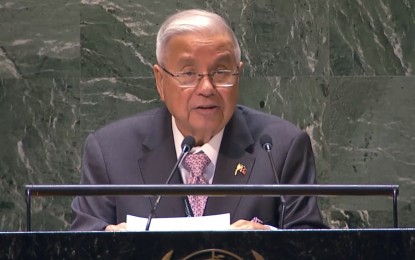
VETO POWER. Philippine Permanent Representative to the United Nations Antonio Lagdameo delivers the country's statement during the 78th UN General Assembly plenary meeting at the UN headquarters in New York, USA on Nov. 16, 2023. He said the Philippines supports calls for a UN Security Council reform that would address issues with the current veto process which hinders swift actions during crisis. (Photo courtesy of UN)
MANILA – The Philippine government backed calls for a United Nations Security Council (UNSC) reform that would improve representation and address issues with the current veto process, which it said “hinders” swift action during crisis such as the Israel-Hamas war.
Speaking at the UN General Assembly’s plenary debate in New York City, New York on Nov. 16 (US time), Philippine Permanent Representative to the UN Antonio Lagdameo emphasized that the Security Council must be more responsive to the rapidly evolving global security architecture.
“The veto power in its current form often hinders the council's ability to act swiftly on critical issues,” he said.
“The Security Council's difficulties in handling crisis such as Myanmar in 2021, Russia-Ukraine in 2022, and currently now, Israel-Hamas, reflect a more polarized world and the conflicting interests of its permanent members,” he added.
Lagdameo pointed out that the veto power should not paralyze the Security Council in dealing with issues concerning peace and war.
“No member states should be granted the special privilege to exercise the veto power as this is in direct contravention of the principle of sovereign equality of all UN member states as enshrined in the Charter,” he said.
Lagdameo recognized that removing the five permanent member states’ veto privileges would be a “challenge” and recommended “curtailing” its use instead.
READ: UN General Assembly adds accountability to Security Council veto
“We reiterate our support to the ACT (Accountability, Coherence and Transparency) code of conduct and the French-Mexican initiative that spell out exceptions to the use of the veto power,” he said.
“However, with the exercise of the veto power not being curtailed, effectiveness and efficiency of the council is under threat,” he added.
In the ongoing Israel-Hamas war, the Security Council was only able to pass its first resolution on Nov. 15, after four failed attempts and more than a month since the crisis broke out on Oct. 7.
Lagdemeo also sought for “more participation” of non-member states in its decision-making process as well as “equitable representation of regions,” including Asia Pacific, Africa, and Latin America.
“The expanded Security Council should ensure a balance between its representativeness and effectiveness in dealing with global issues and concern,” he said.
The UNSC consists of 15 member-states, with China, France, Russian Federation, the United Kingdom, and the United States serving as permanent members.
Under the UN Charter, all member-states are obligated to comply with Council decisions. (PNA)
